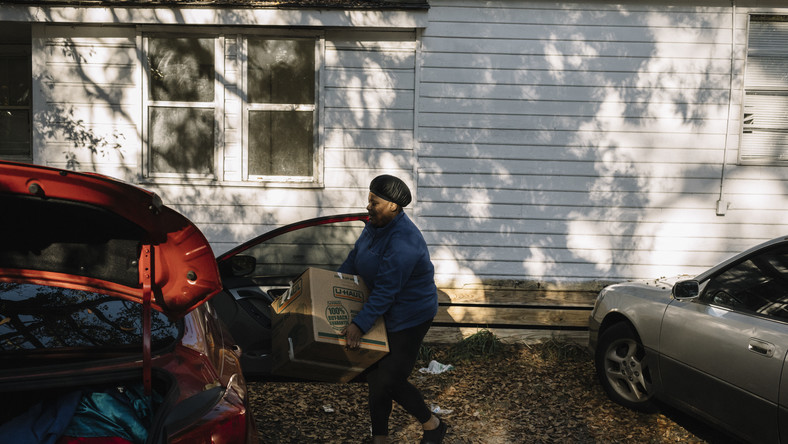Turner’s landlord filed eviction papers against her in mid-November. By early December, the pile of belongings she had no choice but to throw out was starting to grow on the curb. And the family she had tried to hold together was breaking up.
A year and a half ago, Turner’s daughter Twanda Porterfield, 28, was pregnant and living in a hotel. She had lost her two children to the state’s foster care system. Turner moved from Orlando, Florida, vowing to find a home for her daughter, and to get the children back. She did both.
This was the dream they thought they could afford: a drafty little white house with glitchy electrical wiring in a neighborhood set hard against a rail yard. But the $895 rent became the rock that rolled downhill on them, month after month.
A few days before the family moved out, Turner had taken her 9-year-old grandson Anthony to Orlando, where she now planned to raise him in her mother’s house. Porterfield is in a relationship in the Charleston area, and chose to stay there with her two other children.
Turner quit her $13.50-an-hour job at a Charleston parking garage. She had already found new work in Orlando. It involves calling people about unpaid medical bills.
But now she was back in North Charleston to clean up the mess and close down the dream. She brought her son to help with the heavy lifting. He brought his little girl.
It was Saturday. They had to have the place completely cleared out and cleaned up by Monday at 5 p.m. So they got to work — focused, mostly dejected and close to broke.
But they were also briefly reunited, and the children gleefully raced around. Two of them would sleep Saturday night on a pallet on the floor of the half-empty house. They got cold and fought over the covers.
Andrea, Porterfield’s 7-year-old daughter, known as Moochie, said her dream house would be one that tasted sweet: “Like strawberry, chocolate, cherry, apple — like all kinds of colors.”
In reality, Porterfield, Moochie and her 1-year-old brother Anterion, known as Tink, would be staying at a friend’s place for a while. “What new place?” Moochie said. “I would love to see. And bust my head open.” She jumped into an imaginary truck and drove it somewhere.
Turner’s son broke apart her bed, hauling it out piece by piece into a U-Haul truck they had rented. The children buzzed around piles of trash and unpacked stuff.
As the women worked furiously to empty the house, Moochie showed the empty closet where she said a spider had crawled out and bit her brother. It was bigger than a basketball, she said.
Turner worried about her daughter being alone again. Porterfield had a job that paid $11 an hour at the port, but you had to call every night to see if they needed you at work the next day. She was looking for other jobs.
There was a moment when Turner stopped packing and watched as Tink toddled after Porterfield in the driveway. Porterfield had just dumped more stuff on the growing curbside pile. She smiled and did a silly dance for Tink.
They hauled a truckload of boxes to storage. Maybe, Turner thought, she could return for them when she had a bit of money. The storage place was quiet and clean. A purgatory of things.
A glass-topped dining table shattered as they tried to move it. Turner’s flat-screen TV was scratched when she tried to pack it in her Hyundai.
Now it was Sunday. Turner had worked through the night, cleaning the bathroom and kitchen. She had hardly slept.
Tink had been fussing. Turner put him down beside her on a mattress. A smoke alarm misfired with a harsh chirp. Turner laid her head down in the little house for the last time.
This article originally appeared in The New York Times .




